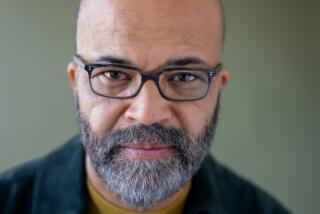‘This Is Where I Leave You’ is a dramatic turn for Bateman, Levy
Between the two of them, actor Jason Bateman and director Shawn Levy have made more than 30 film comedies. So when it came time to shoot one of several dramatic scenes in their new movie, “This Is Where I Leave You,” they felt far from sure-footed.
“I wanted absolute catharsis in a way I’d never seen in a Jason Bateman movie,” Levy said of the scene, in which Bateman’s character stands in his childhood home and tearfully calls up memories of his late father. “In my pocket, my cellphone was filling up with texts from [co-star] Tina Fey saying, ‘I want snot crying.’”
Said Bateman, “It’s a weird thing to make yourself cry. Have you ever done it?” He paused as he shared a late breakfast with Levy at the Toronto International Film Festival last week. “My method was basically looking at pictures of my kids on my iPhone and imagining terrible things happening to them.”
Nothing that traumatic goes down in “This Is Where I Leave You,” a kitchen-sink dramedy about a suburban New York family reuniting for the Jewish mourning ritual of shiva, directed by Levy from a script and book by the novelist Jonathan Tropper. But plenty of raw emotions spill out amid the zingers, as several generations of the Altman clan — including middle brother Judd (Bateman) and older sister Wendy (Fey) — come together for a week of reflection, recrimination and revelations.
The film’s release Friday by Warner Bros. spells not just a risk for a Hollywood studio wading into the throwback waters of a character-driven family tale, but a gamble for its director and lead actor, each of whom makes a notable departure from his comfort zone. It’s the kind of left turn that — depending on the reception — can earn movie veterans admiration for their boldness or head-shaking for their vanity.
“Leave You” begins as the Altmans are gathered for the funeral of their husband and father, an industrious type overshadowed by the outspokenness of his wife, the matriarch Hillary (Jane Fonda). Filled with grievances and resentments, the grown Altman children plan on separating as soon as the last dirt has been shoveled on the grave. But Hillary tells them that their dad’s dying wish was that the family sit shiva, forcing the group to essentially chain themselves together for a week.
What follows is a serious but often acidly funny set of interactions between members of the family — the recently jilted Judd; Wendy, whose sharpie husband is in emotional absentia; haughty eldest son Paul (Corey Stoll), who is taking over the family sporting-goods store; and loose-cannon baby brother Phillip (Adam Driver) — not to mention a colorful assortment of significant others past and present. Many of the lines that family members toss off elicit laughs, but they’re also meant to hurt, or at least shift the blame.
“Through the movie there are these situations that are thick with conflict and vulnerability and various levels of threatening one’s dignity,” Bateman said. “People talk about comedy and drama as if they’re different things, but nothing’s funny unless your pants are down. You have to go through drama to get to comedy.”
The film almost took a different route. When the studio acquired the novel in 2009, executives initially hired Greg Berlanti, a veteran of “Dawson’s Creek” and “Everwood,” to direct. But soon after they had moved on to the “Hairspray” helmer Adam Shankman and planned a broader comedic version; at one point the cast included Jason Sudeikis, Zac Efron and Malin Akerman.
Levy’s arrival two years ago might have moved things even further that way. After all, the director’s résumé epitomizes the modern studio knee-slapper; Levy, 46, is known for such big-budget entertainments as “Date Night” and the popular and effects-driven “Night at the Museum” franchise.
But the filmmaker saw this as an opportunity for his Jim Brooks moment. He told then-Warners chief Jeff Robinov he could make the movie for under $20 million — a rarity for a studio project — if he was given the autonomy to turn it more serious.
He then cast Bateman, who was on in an earlier incarnation, signed dramatic veterans such as Fonda and the character actor Stoll and re-teamed with “Date Night” star Fey (in arguably her most dramatic part), hoping to bring her along for the career reinvention. He also flew Tropper from New York to his Los Angeles home so they could chisel out a more dramatic script.
The resulting film isn’t above the odd outsized moment or cartoonish portrayal. But it’s also meant to make us examine the lives of these characters — and, in a way, our own lives with it. As Fey observes of romantic relationships in one of the film’s rueful moments, “You want the ones you can’t have and … all over the ones you can.” (Fonda told Times reporter Amy Kaufman at the premiere earlier this week that “I thought I knew a lot about Tina Fey. I didn’t think she could make me cry, but she does. That was new. The depth of emotions from Jason Bateman--that was new.”)
As Levy enters his late forties, the film offers him a chance to rethink much of what has come before. The Montreal-raised Hollywood insider, who was working on his upcoming holiday release “Night at the Museum: Secret of the Tomb” simultaneously with this film, has one of the most coveted positions in the movie business--the trades are filled every day with young comedy directors who want what Shawn Levy has. But that status has led to a kind of soul-searching.
“Everyone in every field starts off with what they really want to do,” said the director, who has a kind of assiduously sociable personality. “I became successful with one kind of movie. But it’s never been the only kind of movie I love. It’s never even been the kind of movie I love most. I don’t begrudge the movies I’ve made. But like any creative person, I’m hungry to be creative in a variety of ways.”
He said he hopes this leads to more movies that “examine human frailty with some comedic elements.”
The comedy veteran Kathryn Hahn, who plays Paul’s wife as the two struggle to have a baby, said she observed Levy experiencing a new world. “I think it really challenged him because he didn’t have all the toys he’s used to at his disposal.”
She said that Levy’s dramatic touch could be felt early in the shoot, in a scene where family members smoke pot in a side room of the local temple.
“There’s a long shot, and he easily could have gone to some Hollywood comedy move, some cutaway. But he just let the scene live in a way you never see in big movies.” She added, “You would not look at that scene and think, ‘That’s a Shawn Levy movie.’ But he’s his own bird.”
Bateman was similarly interested in a new direction. A career comeback that began about 10 years ago has led to a glut of comedic roles, including efforts in recent years such as “Horrible Bosses,” “Identity Thief” and the scabrous “Bad Words,” which he also directed. “I’m not,” Bateman said with characteristic understatement, “asked to play the lead in a touching movie every day.” (Bateman said if he had his druthers he’d direct and act in his movies for the foreseeable future, in part because wearing both hats means “one less actor you have to direct--and that actor is reading your mind.”)
There’s a neat symmetry between “Leave You’s” main theme — that we sometimes get locked into patterns we can’t break — and the career arcs of its principals. There is also much in it from their own families — Bateman, who grew up with a sharp-tongued British mother, said he identified with Fonda’s Hillary, while Levy, with five siblings, comes from a family with “arguably too much emotional promiscuity and transparency.” He put some of those bits into the film.
“From the minute I read the book, it felt close to home,” he said, as he prepared to negotiate a wave of family members arriving to the Toronto premiere that evening. “My family has infused the movie with a certain wisdom. But somehow the movie has not infused my life with the same wisdom.”
Twitter: @ZeitchikLAT
More to Read
Only good movies
Get the Indie Focus newsletter, Mark Olsen's weekly guide to the world of cinema.
You may occasionally receive promotional content from the Los Angeles Times.







